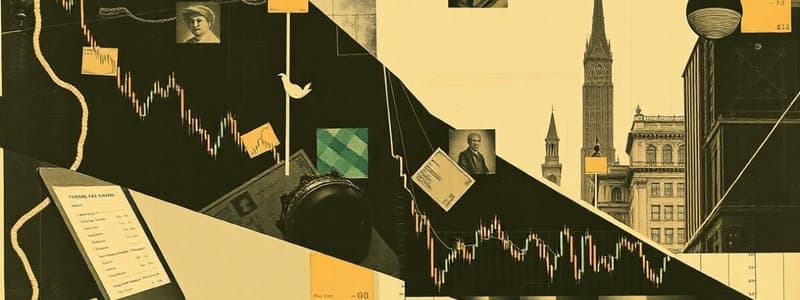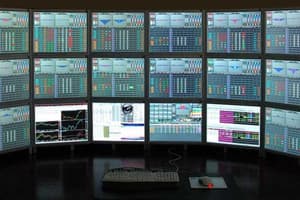Podcast
Questions and Answers
What is the total open interest after the trades on March 2?
What is the total open interest after the trades on March 2?
- 150 contracts (correct)
- 200 contracts
- 50 contracts
- 100 contracts
What happens to the open interest on March 3 as A closes their short position?
What happens to the open interest on March 3 as A closes their short position?
- Increases to 200 contracts
- Decreases to 100 contracts
- Remains at 150 contracts (correct)
- Falls to 50 contracts
What is the effect on open interest when C closes their long position on March 4?
What is the effect on open interest when C closes their long position on March 4?
- Decreases to 50 contracts (correct)
- Falls below 50 contracts
- Remains unchanged at 150 contracts
- Increases to 100 contracts
How is the price band for a futures contract determined on the first trading day?
How is the price band for a futures contract determined on the first trading day?
What is a long position in the context of futures trading?
What is a long position in the context of futures trading?
What is the price range for trading a contract if the previous day's closing price is Rs.100 and the price band is 10%?
What is the price range for trading a contract if the previous day's closing price is Rs.100 and the price band is 10%?
What does it mean if open interest increases in the market?
What does it mean if open interest increases in the market?
What occurs when both long and short positions are closed at the same time?
What occurs when both long and short positions are closed at the same time?
What is the primary purpose of NISM certification examinations and training programs?
What is the primary purpose of NISM certification examinations and training programs?
How many individuals had been certified by NISM through its examinations and programs by March 2023?
How many individuals had been certified by NISM through its examinations and programs by March 2023?
Which of the following topics is NOT covered in the NISM workbook?
Which of the following topics is NOT covered in the NISM workbook?
What is a potential drawback mentioned about the information in the NISM publication?
What is a potential drawback mentioned about the information in the NISM publication?
Which of the following is emphasized about the reliability of information in the publication?
Which of the following is emphasized about the reliability of information in the publication?
What kind of products does the NISM workbook help individuals understand better?
What kind of products does the NISM workbook help individuals understand better?
What is advised before acting on the recommendations provided in the NISM publication?
What is advised before acting on the recommendations provided in the NISM publication?
What responsibility do NISM and SEBI assume regarding the publication's content?
What responsibility do NISM and SEBI assume regarding the publication's content?
Which feature distinguishes forwards from futures contracts?
Which feature distinguishes forwards from futures contracts?
What is a key characteristic of futures contracts regarding counter-party risk?
What is a key characteristic of futures contracts regarding counter-party risk?
In terms of price discovery, how do futures contracts compare to forwards?
In terms of price discovery, how do futures contracts compare to forwards?
What can be concluded about the payoff structure of futures contracts?
What can be concluded about the payoff structure of futures contracts?
How does liquidity differ between forwards and futures contracts?
How does liquidity differ between forwards and futures contracts?
Which statement about the quality of information is TRUE regarding futures contracts?
Which statement about the quality of information is TRUE regarding futures contracts?
What impact does the operational mechanism have on forwards contracts?
What impact does the operational mechanism have on forwards contracts?
What does the payoff diagram for futures contracts represent?
What does the payoff diagram for futures contracts represent?
What happens to the profit in a short futures position if the market price at expiry is Rs. 70?
What happens to the profit in a short futures position if the market price at expiry is Rs. 70?
Which model is NOT mentioned as a popular method for pricing futures contracts?
Which model is NOT mentioned as a popular method for pricing futures contracts?
If a trader shorts futures at Rs. 100 and the market price drops to Rs. 50 at expiry, what is the trader's profit?
If a trader shorts futures at Rs. 100 and the market price drops to Rs. 50 at expiry, what is the trader's profit?
What is the relationship between the long futures position and short futures position in terms of profit and loss?
What is the relationship between the long futures position and short futures position in terms of profit and loss?
What happens to the short futures position payoff as the market price exceeds Rs. 100?
What happens to the short futures position payoff as the market price exceeds Rs. 100?
Under what condition does a short futures position become profitable?
Under what condition does a short futures position become profitable?
What aspect complicates the pricing of futures contracts?
What aspect complicates the pricing of futures contracts?
If a trader anticipates a market price of Rs. 120 at expiry after shorting at Rs. 100, what is the expected outcome?
If a trader anticipates a market price of Rs. 120 at expiry after shorting at Rs. 100, what is the expected outcome?
What is the ideal price calculated from the given bid and offer price of Rs. 9.80 and Rs. 9.90?
What is the ideal price calculated from the given bid and offer price of Rs. 9.80 and Rs. 9.90?
How is the actual buy price calculated for buying 1500 shares from the given data?
How is the actual buy price calculated for buying 1500 shares from the given data?
What defines impact cost in trading?
What defines impact cost in trading?
Which of the following is NOT a part of index management?
Which of the following is NOT a part of index management?
What happens to risk reduction when increasing the number of stocks in an index beyond 50?
What happens to risk reduction when increasing the number of stocks in an index beyond 50?
For which type of trading scenario is impact cost particularly important?
For which type of trading scenario is impact cost particularly important?
Which entity manages the BSE indices?
Which entity manages the BSE indices?
What is a significant trade-off when constructing a stock index?
What is a significant trade-off when constructing a stock index?
Flashcards are hidden until you start studying
Study Notes
Open Interest and Trading Volume
- Open Interest (OI) reflects the number of outstanding contracts at the end of a trading day.
- Trading volume represents the total number of contracts traded during a specific day.
Price Band
- Price Band is the daily price range within which futures contracts can trade.
- It is calculated based on the previous day's closing price, with a percentage-based limit.
- On the first trading day of a futures contract, the price band is determined by the underlying asset's closing price in the cash market.
Market Participant Positions
- Long Position: A long position is an outstanding or unsettled buy position in a contract, like buying futures contracts.
- Short Position: A short position is an outstanding or unsettled sell position in a contract, like selling futures contracts.
Differences Between Forwards and Futures
- Operational Mechanism: Forward contracts are not traded on exchanges and are customized, while futures contracts are exchange-traded and standardized.
- Counterparty Risk: Forward contracts have counterparty risk, potentially mitigated by a guarantor. Futures contracts have the clearing agency as a counterparty, guaranteeing settlement.
- Liquidity Profile: Forwards have low liquidity due to their tailored nature, while futures have high liquidity due to standardization and exchange trading.
- Price Discovery: Forwards have inefficient price discovery as markets are scattered. Futures have efficient price discovery due to a centralized trading platform.
- Quality of Information: Forward contracts may have poor information quality and slow dissemination. Futures have high information quality and rapid dissemination.
Payoff Charts for Futures Contracts
- Payoff charts illustrate profit/loss potential based on the underlying asset's price at expiry.
- Long and short futures positions both have unlimited profit or loss potential.
- The payoff for short futures is the opposite of the payoff for long futures.
- Short futures profit when prices fall, while long futures profit when prices rise.
Impact Cost
- Impact cost is the difference between the ideal price and the actual price paid/received when buying or selling a large volume of shares.
- Ideal price: The average of the best bid and offer price.
- Impact cost varies with the transaction size and can differ for buy and sell orders.
Index Management
- Index construction: Deciding on index stocks and the calculation methodology.
- Index maintenance: Adjusting the index for corporate actions like stock splits or mergers.
- Index revision: Changing the index composition to reflect changes in the trading paradigm or market participant interest.
- Index Management Agencies: Asia Index Pvt Ltd (BSE) and NSE Indices Limited (NSE)
- Trade-off between diversification and liquidity: A good index balances diversification to reduce risk with liquidity to facilitate trading.
Studying That Suits You
Use AI to generate personalized quizzes and flashcards to suit your learning preferences.




